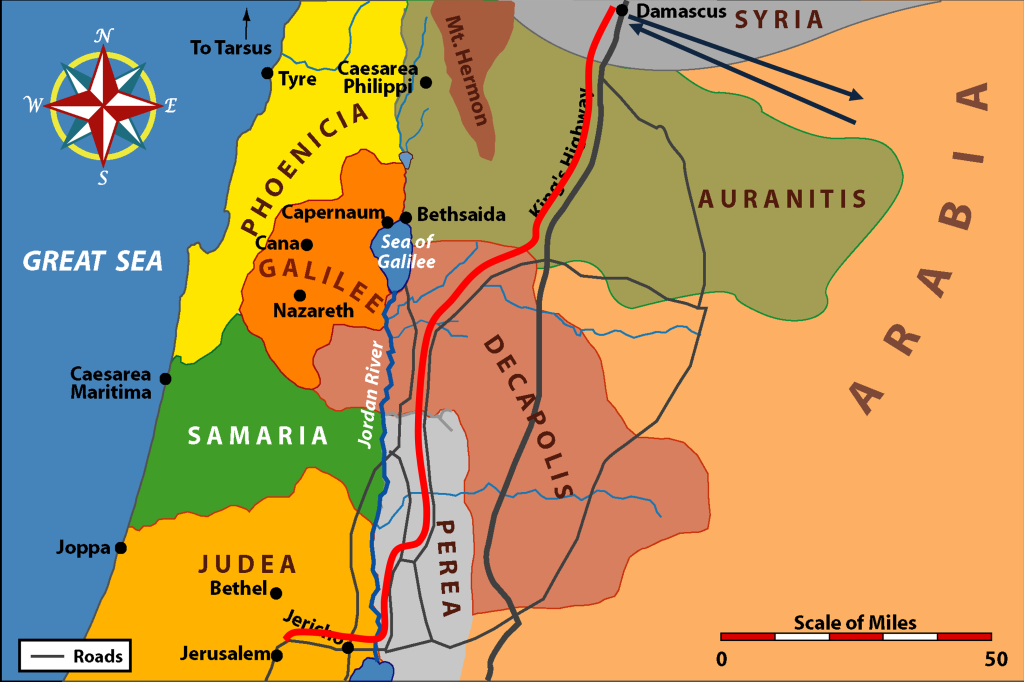| Note | Date | Event | Reference(s) |
| c. | AD 33 | Converted on the road to Damascus. | Acts 9:1-9; 22:6-11; 26:12-18 |
| Spends “some days” in Damascus. | Acts 9:19-22 | ||
| d. | AD 33 – 35/6 | Spends best part of 3 years in Arabia. | Galatians 1:17 |
| AD 35/6 | Returns to Damascus and leaves because of threat on his life. | Acts 9:23-25; 2 Corinthians 11:32-33 |

c. We can date this as AD 33 for the following reasons.
Galatians 2:1 tells us that Paul, Barnabas and Titus went to Jerusalem “after fourteen years”. The question is, fourteen years after what?’
If it’s fourteen years after the first pre-conversion visit mentioned in Galatians 1:17, then this would make it AD 50, the year of the Council of Jerusalem, and would mean that the meetings Paul refers to here in Galatians 2 are the meetings of that Council
However, the way in which Paul speaks about these meetings doesn’t really reflect what we know about that Council as it is recorded in Acts 15. Also, Paul says that he went “because of a revelation” (Galatians 2:2), which would tie in with Acts 11:27-30, where Agabus prophesies a forthcoming famine and Paul and Barnabas are commissioned to take relief to the brothers in Judea.
That would mean that the “after fourteen years” refers to the time since his conversion, which fits the time frame well since this famine relief visit almost certainly took place in AD 47.
d. What does Paul mean by Arabia?
We need to begin by stressing that we must apply good principles of interpretation and ask what was in the mind of the biblical writer – in this case, Paul – when he uses a word.
In Paul’s day, Arabia (aka Arabia Petrea) was a huge area that bordered Palestine to the south and east. It was, in fact, the kingdom of the Nabateans, a formerly nomadic Semitic people who had their own language, kingdom, and deities. Their capital city was Petra, situated in what is today southern Jordan, and the famous spice road passed right through here helping to make the Nabateans a very prosperous people. Indeed, today, the city of Petra is the number one tourist attraction in Jordan. We have no idea how far into Arabian territory Paul may have travelled, and it needn’t have been very far since even the surrounding desert countryside of Damascus would have been classed as Arabia.
King Aretas, to whom Paul refers in 2 Corinthians 11:32-32, had extended the dominance of his kingdom to include parts of Syria, hence his ability to require the governor of Damascus to arrest Paul and have him killed.
What was Paul doing in Arabia?
Why would the Nabatean king even have known about Paul, never mind have wanted to arrest and kill him? The most logical answer to that question is that, as he did “immediately” in Damascus (Acts 9:20), Paul didn’t hesitate to teach and preach wherever he found himself, even in the Gentile Nabatean kingdom of Arabia, the very thing God had saved him and commissioned him to do (Acts 9:15).
Not only does he waste no time in getting down to business, but he doesn’t have to wait long for the first taste of “how he must suffer for the sake of [Jesus’] name.” (Acts 9:16). No doubt enraged by Paul’s preaching about Jesus in his kingdom, and without his permission, King Aretas orders his arrest and death.
I have often spoken of Paul’s three years of one-to-one teaching and training experience in the Arabian wilderness, taught by the Master himself, and that is, undoubtedly true in general terms. However, to be more balanced and accurate, we shouldn’t picture Paul living as a desert hermit, cut off from much of civilisation, waiting on God and learning his theology first hand. I have no doubt that Paul did spend much of his time in solitary study and prayer, but it would appear that actually he got what is, even today, considered to be the best model of training for ministry – on the job as well as in the classroom.
How long was he there for?
The simple answer is that we don’t know. What we do know, from Galatians 1:18, is that three years after his conversion, Paul went up to Jerusalem. During those intervening three years he spent “some days” in Damascus immediately after his conversion (Acts 9:19), followed by almost certainly a lengthy period of time in “Arabia” (Galatians 1:17), and then another indeterminate period of time in Damascus when, “after many days” he made his escape (Acts 9:25).